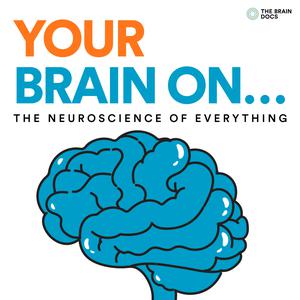
Your Brain On
Drs. Ayesha and Dean Sherzai
- 59 minutes 3 secondsYour Brain On... Omega-3
Omega-3 supplements have become a multi-billion-dollar industry, promising to enhance your memory, boost your mood, and protect your brain. But where does the science end, and the marketing hype begin?
Omega-3 fatty acids are a special category of ‘good fats’ that play vital roles in both brain and body health. Unlike some species, we can’t produce our own Omega-3s, so we must rely on our diets to get these essential fats.
In this episode, we discuss how to get more brain-healthy quantities of Omega-3 into your diet, plus:
• The brain health benefits of Omega-3
• The differences between Omega-3 and Omega-6
• The neurochemical intricacies of ALA, EPA, and DHA
• Why Omega-3s are essential for development at a young age
• The current (and future) state of Omega-3 research
• Who needs Omega-3 supplements, and why
Enriching the discussion this week are two celebrated experts in the field:
DR. RICHARD BAZINET, a professor and researcher whose work focuses on the regulation and role of brain lipid metabolism in neurodegenerative diseases
DR. BILL HARRIS, an internationally-recognised expert on omega-3, and the pioneer behind the Omega-3 Index
This is... Your Brain On Omega-3.
‘Your Brain On’ is hosted by neurologists, scientists and public health advocates Ayesha and Dean Sherzai.
‘Your Brain On...’ is supported by the NEURO World Retreat, taking place in San Diego, September 2–5 2025: https://neuroworldretreat.com/
‘Your Brain On... Omega-3’ • SEASON 4 • EPISODE 7
———
LINKS
DR. RICHARD BAZINET
Dr. Bazinet at University of Toronto: https://nutrisci.med.utoronto.ca/faculty/richard-bazinet
DR. BILL HARRIS
Dr. Harris at OmegaQuant: https://omegaquant.com/dr-william-s-harris/
———
FOLLOW US
Join the NEURO Academy: NEUROacademy.com
Instagram: @thebraindocs
Website: TheBrainDocs.com
More info and episodes: TheBrainDocs.com/Podcast
22 January 2025, 8:24 am - 48 minutes 38 secondsYour Brain On... Social Media
Two decades on from the start of the smartphone revolution, we have the first humans who, for as long as they’ve been alive, have had the entire internet just a few taps away. What has this done to our brains?
It’s been an unprecedented period of rapid change, and, with the largest social networking sites using every neurological trick in the book to keep us endlessly scrolling down our feeds, what can we do to make our relationship with social media healthier?
In this episode of ‘Your Brain On...’, we discuss:
• The brain health risks of social media overuse (and rewards of healthy use!)
• How social media apps are designed to keep us addicted
• Structural brain changes that have been sparked by the digital age
• The neuroscience of doom-scrolling, social comparison, social media’s impact on sleep
• Practical steps to balance our social media use
We’re joined by two internationally-renowned experts on these topics:
DR. JEAN TWENGE, a researcher, author, and psychologist known for her work on how social media affects the mental health of different generations.
DR. LARRY ROSEN, co-author of ‘The Distracted Mind’ and celebrated expert in the psychology of technology.
This is... Your Brain On Social Media.
‘Your Brain On’ is hosted by neurologists, scientists and public health advocates Ayesha and Dean Sherzai.
‘Your Brain On... Social Media’ • SEASON 4 • EPISODE 6
‘Your Brain On...’ is supported by the NEURO World Retreat, taking place in San Diego, September 2–5 2025: https://neuroworldretreat.com/
———
LINKS
DR. JEAN TWENGE
Dr. Twenge’s website: https://www.jeantwenge.com/
at San Diego State University: https://psychology.sdsu.edu/people/jean-twenge/
DR. LARRY ROSEN
Dr. Rosen’s website: https://drlarryrosen.com/
———
FOLLOW US
Join the NEURO Academy: NEUROacademy.com
Instagram: @thebraindocs
Website: TheBrainDocs.com
More info and episodes: TheBrainDocs.com/Podcast
15 January 2025, 6:41 am - 51 minutes 10 secondsYour Brain On... (Sherzai Family Holiday Special)
Our incredible kids Sophia and Alex Sherzai join us for a special end-of-year episode of the ‘Your Brain On...’ episode!
As a family of neuroscientists — Sophia in biomedical engineering, Alex in artificial intelligence, Ayesha in vascular neurology, and Dean in behavioral neurology — we have fascinating discussions (and debates) about all aspects of life and brain health almost every day.
To close out the first year of the ‘Your Brain On...’ podcast, we’re bringing that energy to the show!
We discuss:
• Life as a family of neuroscientists
• What we’ve been working on and researching in 2024
• How to navigate the challenges and complexities of the holidays
• Our hopes and goals for 2025
• The top ten most popular episodes of ‘Your Brain On...’ in 2024!
• The importance of connection, community, and change
This is... the Sherzai Family Holiday Special of ‘Your Brain On...’!
‘Your Brain On’ is hosted by neurologists, scientists, and public health advocates Ayesha and Dean Sherzai.
SEASON 4 • EPISODE 5
25 December 2024, 6:56 am - 49 minutes 57 secondsYour Brain On... Ketogenic Diets
High in fats and low in carbs, ketogenic diets were originally developed in the 1920s to treat children with epilepsy. Now, they’ve gained popularity for weight loss, and even improved cognitive function.
But how much truth is there in the purported brain health benefits we see on social media? In this episode of ‘Your Brain On...’, we separate the facts from the fads, and discuss:
• What one might eat on a typical ketogenic diet
• How ketogenic diets affect brain metabolism
• The different ways your brain uses sources of energy — glucose vs. ketones
• The latest data on ketogenic diet in Alzheimer’s disease patients
• What we know about how ketogenic diets and treatment of Alzheimer’s
• The outcome differences between ketogenic diets and ketone supplements in Alzheimer’s
• Other evidence-based nutritional approaches for brain health
For this episode, we welcome two world-renowned professionals in the field of nutrition and neuroscience:
DR. MATTHEW TAYLOR, PhD, RD, Assistant Professor, Dietetics and Nutrition, Kansas University Medical Center
DR. RUSSELL SWERDLOW, MD, Gene and Marge Sweeney Professor of Neurology; Director, Alzheimer's Disease Research Center, Kansas University Medical Center
This is... Your Brain On Ketogenic Diets.
‘Your Brain On’ is hosted by neurologists, scientists and public health advocates Ayesha and Dean Sherzai.
‘Your Brain On... Ketogenic Diets’ • SEASON 4 • EPISODE 4
FOLLOW US
Instagram: @thebraindocs
Website: TheBrainDocs.com
More info and episodes: TheBrainDocs.com/Podcast
REFERENCES
1. Wheless, James W. "History of the ketogenic diet." Epilepsia 49 (2008): 3-5.
2. Krolak-Salmon, Pierre, Russell H. Swerdlow, Thibault Mastain, Catherine Dive-Pouletty, Nick Pooley, and Masoumeh Kisomi. "Efficacy and Safety of Exogenous Ketones in People with Mild Neurocognitive Disorder and Alzheimer’s Disease: A Systematic Literature Review." Nutrition Reviews (2024): nuae098.
3. Taylor, Matthew K., Debra K. Sullivan, Jonathan D. Mahnken, Jeffrey M. Burns, and Russell H. Swerdlow. "Feasibility and efficacy data from a ketogenic diet intervention in Alzheimer's disease." Alzheimer's & Dementia: Translational Research & Clinical Interventions 4 (2018): 28-36.
4. Taylor, Matthew K., Russell H. Swerdlow, and Debra K. Sullivan. "Dietary neuroketotherapeutics for Alzheimer’s disease: an evidence update and the potential role for diet quality." Nutrients 11, no. 8 (2019): 1910.
5. Koppel, Scott J., and Russell H. Swerdlow. "Neuroketotherapeutics: a modern review of a century-old therapy." Neurochemistry international 117 (2018): 114-125.
6. O'Neill, Blair, and Paolo Raggi. "The ketogenic diet: Pros and cons." Atherosclerosis 292 (2020): 119-126.
7. Crosby, Lee, Brenda Davis, Shivam Joshi, Meghan Jardine, Jennifer Paul, Maggie Neola, and Neal D. Barnard. "Ketogenic diets and chronic disease: weighing the benefits against the risks." Frontiers in nutrition 8 (2021): 702802.
18 December 2024, 7:22 am - 46 minutes 57 secondsYour Brain On... ALS
ALS, a nervous system disease, ruled the headlines in the summer of 2014 thanks to the viral Ice Bucket Challenge. How has our knowledge of the disorder evolved a decade later?
Amyotrophic lateral sclerosis, also known as ‘Lou Gehrig's disease’ (named after the iconic baseball player), is a progressive neurological disorder which breaks down a person’s motor neurons. The main symptoms are muscle weakness and impaired physical function — mild, at first, but in the latter stages of the disease’s progression, essential processes like breathing begin to fail.
Most individuals face a life expectancy of two to five years. A small percentage live five to ten years. And an even tinier group survive beyond a decade. Most famously, renowned physicist Stephen Hawking survived more than 50 years past his diagnosis, in part due to the intensive care he was able to afford.
In this episode of the ‘Your Brain On...’ podcast, we discuss:
• What ALS is, and how it affects the brain and the body
• The onset and progression of ALS, from the earliest symptoms to the end-stage impacts
• How ALS patients are diagnosed, treated, and cared for
• Likely causes of ALS, including genetic predispositions and potential environmental risk factors
• How new technologies are rapidly accelerating our understanding of ALS, especially in genetics
Joining us for this installment of the show are two world-class experts on the disease:
• Professor Ammar Al-Chalabi PhD, Professor of Neurology and Complex Disease Genetics at the Maurice Wohl Clinical Neuroscience Institute at King's College.
• Merit Cudkowicz, Director of the Sean M. Healey & AMG Center for ALS at Massachusetts General Hospital.
‘Your Brain On’ is hosted by neurologists, scientists and public health advocates Ayesha and Dean Sherzai.
‘Your Brain On... ALS’ • SEASON 4 • EPISODE 3
———
LINKS
PROFESSOR AMMAR AL-CHALABI
at King’s College: https://www.kcl.ac.uk/people/ammar-al-chalabi
at Motor Neurone Disease Disease Association: https://www.mndassociation.org/get-involved/cure-finders/professor-ammar-al-chalabi
Project MinE: https://projectmine.com/
MERIT CUDKOWICZ
at Massachusetts General Hospital: https://www.massgeneral.org/doctors/16904/merit-cudkowicz
at Harvard University: https://researchers.mgh.harvard.edu/profile/1520993/Merit-Cudkowicz
———
ANNOUNCING: NEURO WORLD RETREAT 2025
We’re so excited to share something very close to our hearts, which we’ve been working on over the past few months: our first ever brain health retreat!
You’re warmly invited to join us in San Diego, California for the inaugural NEURO World Retreat 2025, taking place September 2–5, 2025 at the breathtaking Paradise Point Resort.
For more information, and to book, visit: https://neuroworldretreat.com/
———
FOLLOW US
Join the NEURO Academy: NEUROacademy.com
Instagram: @thebraindocs
Website: TheBrainDocs.com
More info and episodes: TheBrainDocs.com/Podcast
———
References:
Brown, Robert H., and Ammar Al-Chalabi. "Amyotrophic lateral sclerosis." New England Journal of Medicine 377.2 (2017): 162-172.
Benatar, Michael, et al. "A roadmap to ALS prevention: strategies and priorities." Journal of Neurology, Neurosurgery & Psychiatry 94.5 (2023): 399-402.
Voigtlaender, Sebastian, et al. "Artificial intelligence in neurology: opportunities, challenges, and policy implications." Journal of Neurology 271.5 (2024): 2258-2273.
Zinman, Lorne, and Merit Cudkowicz. "Emerging targets and treatments in amyotrophic lateral sclerosis." The Lancet Neurology 10.5 (2011): 481-490.
Raghav, Yogindra, et al. "Identification of gene fusions associated with amyotrophic lateral sclerosis." Muscle & Nerve 69.4 (2024): 477-489.
Su, Feng-Chiao, et al. "Association of environmental toxins with amyotrophic lateral sclerosis." JAMA neurology 73.7 (2016): 803-811.
Talbott, Evelyn O., et al. "Case-control study of environmental toxins and risk of amyotrophic lateral sclerosis involving the national ALS registry." Amyotrophic Lateral Sclerosis and Frontotemporal Degeneration (2024): 1-10.
11 December 2024, 6:48 am - 44 minutes 45 secondsYour Brain On... Ketamine
For decades, ketamine has mainly been used as an anaesthetic, but in more recent years, it’s gained popularity in mental health treatment.
Conversations around the benefits and risks associated with its therapeutic usage ignited towards the end of 2023, when actor Matthew Perry, star of the sitcom ‘Friends’, died from the acute effects of the ketamine he was using to treat anxiety.
In this episode of ‘Your Brain On...’, we discuss:
• The neurochemical mechanisms of ketamine, and its interplay with depression
• What we know about the opportunities and pitfalls of using ketamine in mental health treatment
• The potential for ketamine use in reducing the impacts of neurodegenerative diseases like Alzheimer’s and Parkinson’s
• How technology and improvements in passive and active data collection are helping us better understand how ketamine affects cognition and neuroplasticity
• The history of ketamine’s use as an antidepressant
• How ketamine is actually administered, through various dosages and courses of treatment
We’re welcoming two of the leading figures in this space to the podcast: Dr. Gerard Sanacora, who is a Professor of Psychiatry at Yale University and the Director of the Yale Depression Research Program, and Dr. John Krystal, also from Yale: a Professor of Psychiatry, Neuroscience, and Psychology.
This is... Your Brain On Ketamine.
‘Your Brain On’ is hosted by neurologists, scientists and public health advocates Ayesha and Dean Sherzai.
‘Your Brain On... Ketamine’ • SEASON 4 • EPISODE 2
———
LINKS
DR. GERARD SANACORA
Dr. Sanacora at Yale: https://medicine.yale.edu/profile/gerard-sanacora/
The Yale Depression Research Program: https://medicine.yale.edu/psychiatry/depression/
DR. JOHN KRYSTAL
Dr. Krystal at Yale: https://medicine.yale.edu/profile/john-krystal/
———
FOLLOW US
Join the NEURO Academy: NEUROacademy.com
Instagram: @thebraindocs
Website: TheBrainDocs.com
More info and episodes: TheBrainDocs.com/Podcast
4 December 2024, 6:46 am - 1 hour 8 minutesYour Brain On... Sex
From the first spark of attraction, all the way to climax, sex sets off chemical fireworks in your brain.
And yet, this beautiful, powerful act has become mired in shame and stigma. But through open conversation and deeper scientific understanding, we can cast off those shackles, and even embrace sex as a marker for cognitive and overall health.
In this episode of ‘Your Brain On...’ — our Season 4 debut! — we discuss:
• The neurological processes involved with sex, arousal, attraction, and desire • Why studying the cognitive effects of sexual stimuli can be so complicated • How our relationship with sex is altered as we age, and is affected by periods of change like menopause • The neuroscientific differences between masturbation and sex with a partner • The complex debate about pornography consumption, and the need for better sex education • The links between brain health, heart health, mental health, and sexual health • The benefits of good nutrition, exercise, and stress management for sexual health • Motivations and methods for freeing conversations about sex from stigmas and taboos — especially for women
Joining us for this immensely important conversation are two fantastic guests: sexual behaviour expert and data scientist Dr. Nicole Prause, and sexual medicine expert and urogynecologist Rena Malik.
This is... Your Brain On Sex.
‘Your Brain On’ is hosted by neurologists, scientists and public health advocates Ayesha and Dean Sherzai.
‘Your Brain On... Sex’ • SEASON 4 • EPISODE 1 (SEASON 4 DEBUT)
—
LINKS
Dr. Nicole Prause at UCLA: https://www.uclahealth.org/departments/medicine/gastro/research/labs-and-programs/patel-laboratory
Dr. Nicole Prause on Twitter: https://x.com/nicolerprause
Dr. Nicole Prause on Bluesky: https://bsky.app/profile/nicolerprause.bsky.social
Dr. Rena Malik’s website: https://renamalikmd.com/
Dr. Rena Malik on YouTube: https://www.youtube.com/@RenaMalikMD
Dr. Rena Malik on Instagram: https://www.instagram.com/renamalikmd/
—
FOLLOW US
Join the NEURO Academy: NEUROacademy.com
Instagram: @thebraindocs
Website: TheBrainDocs.com
More info and episodes: TheBrainDocs.com/Podcast
20 November 2024, 9:00 am - 56 minutes 49 secondsYour Brain On... Protein
Protein — how much do we need? What’s the healthiest way to consume it? Can we get enough from plant-based diets?
Until recent decades, protein hasn’t been quite as prominent in public health discussions as sugar and fats. However, with longer lifespans emphasizing the importance of protein for long-term health, and growing confusion around the quality and quantity of protein needed, it has become a highly debated macronutrient.
In ‘Your Brain On… Protein’, we explore:
• The brain health benefits (and general health benefits) of protein
• Plant-based protein vs. meat protein, and supplements like protein powders
• How much protein we really need to eat every day
• Ways we can all introduce more protein into our diets
• Why ‘health’ influencers are suddenly recommending unusually high levels of protein consumption
• How we measure the quality of proteins, including digestibility and absorption
In this episode, we’re joined by two fantastic nutrition experts:
DR. MATTHEW NAGRA, nutritionist and science communicator.
DR. ALAN FLANAGAN, esteemed nutrition scientist (previously featured in ‘Your Brain On… Sugar’ and ‘Your Brain On… Fats’
‘Your Brain On’ is hosted by neurologists, scientists and public health advocates Ayesha and Dean Sherzai.
Drs. Ayesha and Dean are now welcoming patients via the Brain Health Institute: https://brainhealthinstitute.com/
‘Your Brain On... Protein’ • SEASON 3 • EPISODE 10 (SEASON 3 FINALE!)
———
LINKS:
Dr. Matt Nagra
Instagram: https://www.instagram.com/dr.matthewnagra
Website: https://drmatthewnagra.com/
Dr. Alan Flanagan
Alan on Instagram: https://www.instagram.com/thenutritionaladvocate
Alinea Nutrition: https://www.alineanutrition.com/
———
REFERENCES:
Dietary Patterns and Risk of Dementia: a Systematic Review and Meta-Analysis of Cohort Studies. https://doi.org/10.1007/s12035-015-9516-4
Dietary fat composition and dementia risk. https://doi.org/10.1016/j.neurobiolaging.2014.03.038
Dietary Protein and Amino Acids in Vegetarian Diets—A Review. https://pmc.ncbi.nlm.nih.gov/articles/PMC6893534/
Animal vs Plant-Based Meat: A Hearty Debate. https://pubmed.ncbi.nlm.nih.gov/38934982/
High-Protein Plant-Based Diet Versus a Protein-Matched Omnivorous Diet to Support Resistance Training Adaptations: A Comparison Between Habitual Vegans and Omnivores. https://pubmed.ncbi.nlm.nih.gov/33599941/
Vegan and Omnivorous High Protein Diets Support Comparable Daily Myofibrillar Protein Synthesis Rates and Skeletal Muscle Hypertrophy in Young Adults. https://pubmed.ncbi.nlm.nih.gov/36822394/
Digestibility issues of vegetable versus animal proteins: protein and amino acid requirements--functional aspects. https://pubmed.ncbi.nlm.nih.gov/23964409/
Soy and Isoflavone Consumption and Multiple Health Outcomes: Umbrella Review of Systematic Reviews and Meta-Analyses of Observational Studies and Randomized Trials in Humans. https://doi.org/10.1002/mnfr.201900751
No Difference Between the Effects of Supplementing With Soy Protein Versus Animal Protein on Gains in Muscle Mass and Strength in Response to Resistance Exercise. https://pubmed.ncbi.nlm.nih.gov/29722584/
Neither soy nor isoflavone intake affects male reproductive hormones: An expanded and updated meta-analysis of clinical studies. https://pubmed.ncbi.nlm.nih.gov/33383165/
The health effects of soy: A reference guide for health professionals. https://pmc.ncbi.nlm.nih.gov/articles/PMC9410752/
The Effect of Plant-Based Protein Ingestion on Athletic Ability in Healthy People—A Bayesian Meta-Analysis with Systematic Review of Randomized Controlled Trials. https://www.mdpi.com/2072-6643/16/16/2748
Effects of high-quality protein supplementation on cardiovascular risk factors in individuals with metabolic diseases: A systematic review and meta-analysis of randomized controlled trials. https://doi.org/10.1016/j.clnu.2024.06.013
Vegan and Omnivorous High Protein Diets Support Comparable Daily Myofibrillar Protein Synthesis Rates and Skeletal Muscle Hypertrophy in Young Adults. https://pubmed.ncbi.nlm.nih.gov/36822394/
17 October 2024, 7:06 am - 1 hour 4 minutesYour Brain On... Misinformation
The digital age has made it easier than ever to access health information, but how can we know which sources to trust?
Social media is saturated with misinformation. Some of it is inadvertent — many bold pseudoscientific claims seem very convincing, and anyone could be forgiven for sharing it with the best intentions.
But, a more deliberate manipulation of scientific information has become commonplace, often used to push certain narratives or turn a profit.
Combating this misinformation machine can feel impossible. So, we assembled five experts from different corners of the science communication community to help equip you for the fight:
Dr. David L. Katz, MD, MPH, a renowned figure in the field of preventive medicine, public health, and nutrition. (Website: https://davidkatzmd.com/)
Steven Novella MD, clinical neurologist and associate professor at Yale University School of Medicine, a host of The Skeptics' Guide to the Universe podcast, and a founder of the New England Skeptical Society. (Website: https://theness.com/neurologicablog/)
Dr. Jessica Steier PhD, public health scientist and host of the wildly popular Unbiased Science podcast. (Instagram: https://www.instagram.com/unbiasedscipod)
Dr. Jonathan Stea PhD, clinical psychologist and author of the book ‘Mind the Science’. (Instagram: https://www.instagram.com/dr_jonathan_stea/ / Website: https://www.jonathanstea.com/)
Dr. Idrees Mughal, AKA ‘Dr. Idz’, one of the most popular online misinformation-debunking social media icons. (TikTok: https://www.tiktok.com/@dr_idz / Website: https://www.schoolofdridz.com/)
Together, we discuss:
• The telltale signs of pseudoscientific messaging.
• Where misinformation comes from, and why it often spreads faster than evidence-based facts.
• Why we can be so susceptible to believing misinformation.
• Who profits by poisoning the science communication space.
• How we can improve our scientific literacy and avoid echo chambers.
• Ways academics can improve their public health communication.
• ‘Your Brain On’ is hosted by neurologists, scientists and public health advocates Ayesha and Dean Sherzai.
‘Your Brain On... Misinformation’ • SEASON 3 • EPISODE 9
9 October 2024, 6:59 am - 1 hour 5 minutesYour Brain On: A Brain Health Revolution Summit Special
20 incredible conversations with leading scientists, in one hour.
We’re excited to present this special installment of Your Brain On, featuring highlights from some of the speakers talking at our first ever Brain Health Revolution Summit.
Our first summit, running September 30 through October 6 2024, features seven days of hour-long discussions with the scientists who are actually conducting the studies, publishing the papers, and pushing public health policy reforms that are shaping our world.
No matter when you’re listening to this episode, visit https://bhrsummit.com/ for more information about the summit — be it our first 2024 edition, or a future installment!
Day 1: The Brain Health Landscape: From Insights to Action
Day 2: Mental Health Matters and Heart Health for a Stronger Brain
Day 3: Women’s Brain Health: Hormones, Longevity, and Vitality
Day 4: Emerging Challenges in Brain Health
Day 5: Fuel for Thought: Nutrition, the Gut, and the Brain
Day 6: Move, Breathe, Thrive: Exercise and Stress Management
Day 7: Recharge and Optimize: Sleep and Cognitive Performance
This special episode includes excerpts of our conversations with:
Rachel Dolhun, MD
Michael Okun, MD
Charles DeCarli, MD
Ari Tuckman, PsyD
Amishi Jha, PhD
Danielle Belardo, MD
Margarett McCarthy, PhD
Lisa Mosconi, PhD
Lisa Genova
Idrees ‘Dr. Idz’ Mughal, MBBS, MRes, DipIBLM
Daniele Piomelli, PhD
Frank Lin, MD, PhD
Alan Flanagan, PhD
Matthew Nagra, ND
Stuart Phillips, PhD
Natali Edmonds, PhD
Satchin Panda, PhD
Donn Posner, MD
Sujay Kansagra, MD
Yaakov Stern, PhD
For more information about the Brain Health Revolution Summit, visit: https://bhrsummit.com/
The Brain Health Revolution Summit 2024 is presented in partnership with Healthy Minds Initiative: thymindsinitiative.org
‘Your Brain On’ is hosted by neurologists, scientists and public health advocates Ayesha and Dean Sherzai.
2 October 2024, 7:08 am - 55 minutes 45 secondsYour Brain On... Having A Pet
What are our animal companions thinking? And how does our friendship with them change their brains, and our brains?
We all wish we could communicate with our pets. Though we may never share a language, modern neuroscience has enabled us to ethically understand the cognitive anatomy and emotional signals of other animals like never before.
In this episode of ‘Your Brain On...’, we discuss what we’ve learned so far, including:
• The neurological phenomena that leads to domestication and, in turn, animal companionship
• How oxytocin studies have signified that, yes, our dogs do love us back
• The research that has shown how some companions might value social rewards from humans just as much as they value the food we provide for them
• The differences (and similarities) between canine brains and human brains
• How dogs do understand us to a degree, but not quite in the linguistic sense we might like to believe
• The incredible things dogs can do for dementia patients
• The importance of ethics in animal research
• Why understanding the emotional capacity of other animals is vital
Our guests for this episode are two of the foremost voices in animal cognition:
BRIAN HARE: Professor in Evolutionary Anthropology, Psychology, and Neuroscience at Duke University, and a core member of their Center of Cognitive Neuroscience. Plus: co-author of ‘The Genius of Dogs’ and ‘Survival of the Friendliest’.
GREGORY BERNS: Professor of Psychology and Distinguished Professor of Neuroeconomics, researcher of dogs (and more recently, cows), and author of ‘How Dogs Love Us’ and ‘Cowpuppy: An Unexpected Friendship and a Scientist’s Journey into the Secret World of Cows’.
‘Your Brain On’ is hosted by neurologists, scientists and public health advocates Ayesha and Dean Sherzai.
Drs. Ayesha and Dean are now welcoming patients via the Brain Health Institute: https://brainhealthinstitute.com/
‘Your Brain On... Having A Pet’ • SEASON 3 • EPISODE 8
———
LINKS
Brian Hare:
Brian Hare’s website: https://brianhare.net/
The Hare Lab at Duke University: https://evolutionaryanthropology.duke.edu/hare-lab
Brian’s book, ‘Survival of the Friendliest’: https://a.co/d/2mNhSE1
Gregory Berns:
Gregory Berns’ website: http://gregoryberns.com/
Gregory’s book, ‘Cowpuppy’: https://a.co/d/0gpJYQx
———
FOLLOW US
Join the NEURO Academy: NEUROacademy.com
Instagram: @thebraindocs
Website: TheBrainDocs.com
More info and episodes: TheBrainDocs.com/Podcast
25 September 2024, 6:53 am - More Episodes? Get the App
Your feedback is valuable to us. Should you encounter any bugs, glitches, lack of functionality or other problems, please email us on [email protected] or join Moon.FM Telegram Group where you can talk directly to the dev team who are happy to answer any queries.
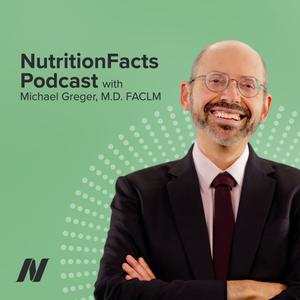 Nutrition Facts with Dr. Greger
Nutrition Facts with Dr. Greger
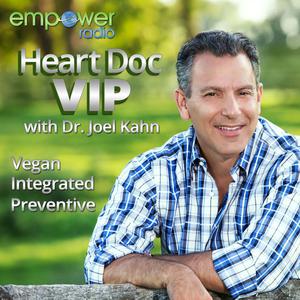 Heart Doc VIP with Dr. Joel Kahn
Heart Doc VIP with Dr. Joel Kahn
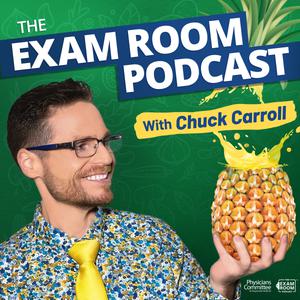 The Exam Room by the Physicians Committee
The Exam Room by the Physicians Committee
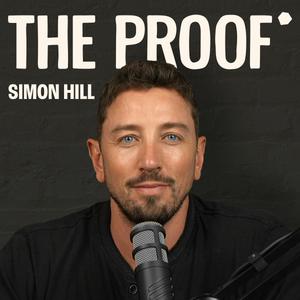 The Proof with Simon Hill
The Proof with Simon Hill
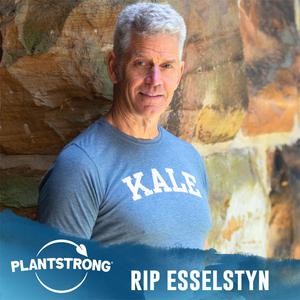 PLANTSTRONG Podcast
PLANTSTRONG Podcast
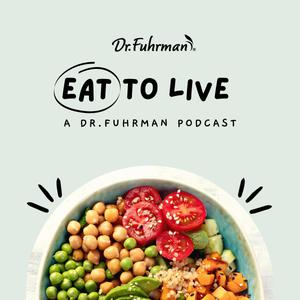 Eat to Live
Eat to Live